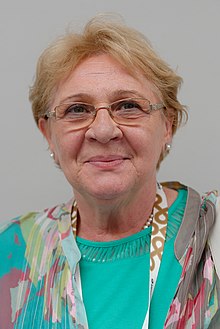Ana Derșidan-Ene-Pascu
| Ana Derșidan-Ene-Pascu | ||||||||||||||||||||||||||||||||||||||||||
|---|---|---|---|---|---|---|---|---|---|---|---|---|---|---|---|---|---|---|---|---|---|---|---|---|---|---|---|---|---|---|---|---|---|---|---|---|---|---|---|---|---|---|
 Pascu at the 2013 World Fencing Championships | ||||||||||||||||||||||||||||||||||||||||||
| Personal information | ||||||||||||||||||||||||||||||||||||||||||
| Born | 22 September 1944 Bucharest, Romania[1] | |||||||||||||||||||||||||||||||||||||||||
| Died | 6 April 2022 (aged 77) | |||||||||||||||||||||||||||||||||||||||||
| Height | 163 cm (5 ft 4 in)[1] | |||||||||||||||||||||||||||||||||||||||||
| Weight | 59 kg (130 lb) | |||||||||||||||||||||||||||||||||||||||||
| Sport | ||||||||||||||||||||||||||||||||||||||||||
| Weapon | Foil | |||||||||||||||||||||||||||||||||||||||||
| Hand | Right-handed | |||||||||||||||||||||||||||||||||||||||||
| Club | Progresul București CSA Steaua București[2] | |||||||||||||||||||||||||||||||||||||||||
| Head coach | Ghita Man Angelo Pelegrini Andrei Valcea[2] | |||||||||||||||||||||||||||||||||||||||||
| Retired | 1976 | |||||||||||||||||||||||||||||||||||||||||
Medal record
| ||||||||||||||||||||||||||||||||||||||||||
Ana Derșidan-Ene-Pascu (22 September 1944 – 6 April 2022) was a Romanian fencer and sport leader.[3] She won a bronze medal in the women's team foil events at the 1968 and 1972 Summer Olympics.[4][1]
Biography
[edit]The daughter of the vice-president of the Romanian Table Tennis Federation, Pascu was fascinated as a child by elite sport.[5] Her first sport idols were table tennis players Angelica Rozeanu and Sari Szasz, who were then at the peak of their careers. When Pascu's father took a position at the Romanian Fencing Federation, she transferred her interests to the sport, which was practiced at the Athenaeum of Bucharest, and whose athletes spoke French.[5] At the age of eleven, she began to take fencing lessons with Italian master Angelo Pellegrini. Future champion Maria Vicol featured amongst his other pupils.
Pascu won the 1963 Junior World Championship in Ghent, a result she considered as the best of her career. She joined the senior national team, which featured Maria Vicol and Marina Stanca. They were later joined by Olga Szabo, Ileana Gyulai, Ecaterina Stahl, and Suzana Ardeleanu.[5] Romania was one of the only countries at the time offering centralised training in fencing: the national team trained twice a day, nine months a year.[5] She made a brilliant career with the Romanian team: she won seven medals in the World Championships and took part in five Olympic Games, earning two bronze medals in 1968 and 1972. She was awarded the title of master emeritus in sports (Maestru Emerit al Sportului) for her performance.[6]
She retired in 1976, after the Summer Olympics of Montreal. In 1981, she gave birth to a son, Alexandru.[5] She led the Romanian Fencing Federation from 1982 to 2013, when she opted not to run for a new term, leaving the road open to Mihai Covaliu.[7] She served as honorary president of the FRS. She was also vice-president of the Romanian Olympic and Sports Committee since 2004.[6]
Pascu was a member of the Rules Commission of the International Fencing Federation (FIE) from 1984 to 1996 and sat at the Refereeing Commission from 1996 to 2004.[6] She was a member of the executive committee of the FIE since 2000 and a vice-president between 2004 and 2021.[6]
References
[edit]- ^ a b c "Ana Derșidan-Ene-Pascu". sports-reference.com. Archived from the original on 17 April 2020. Retrieved 20 December 2010.
- ^ a b Ana Pascu. Romanian Olympic Committee
- ^ Fosta mare scrimeră Ana Pascu a încetat din viață la vârsta de 77 de ani Archived 25 May 2022 at the Wayback Machine (in Romanian)
- ^ "Olympics Statistics: Ana Derşidan-Ene-Pascu". databaseolympics.com. Archived from the original on 29 September 2011. Retrieved 20 December 2010.
- ^ a b c d e Oana Dușmănescu (10 December 2014). "Interviu: "Cînd faci un sport de drag, nici nu îți dai seama ce sacrifici"". Gazeta Sporturilor (in Romanian).
- ^ a b c d "Hall of Fame – Ana Pascu". International Fencing Federation. Archived from the original on 24 June 2013. Retrieved 24 June 2013.
- ^ Radu Levârdă (24 April 2013). "Ana Pascu: "I-am predat ştafeta lui Mihai Covaliu"". Sport Revolution (in Romanian).
External links
[edit]- Ana Pascu at the Comitetul Olimpic și Sportiv Român (in Romanian) (English translation)
- Ana Dersidan-Ene-Pascu at Olympics.com
- Ana Derșidan-Ene-Pascu at Olympics at Sports-Reference.com (archived)
- 1944 births
- 2022 deaths
- Romanian female fencers
- Romanian foil fencers
- Olympic fencers for Romania
- Fencers at the 1964 Summer Olympics
- Fencers at the 1968 Summer Olympics
- Fencers at the 1972 Summer Olympics
- Fencers at the 1976 Summer Olympics
- Olympic bronze medalists for Romania
- Fencers from Bucharest
- Olympic medalists in fencing
- Medalists at the 1968 Summer Olympics
- Medalists at the 1972 Summer Olympics
- Presidents of the Romanian Fencing Federation
